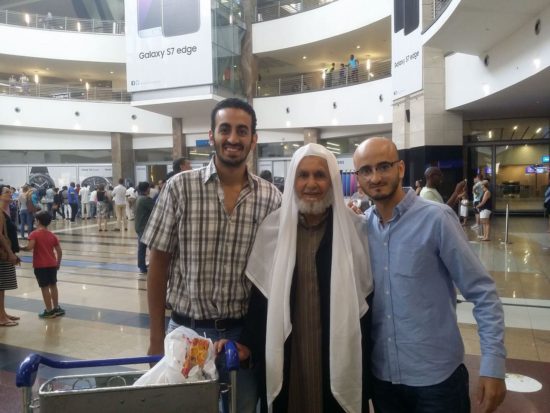After a harrowing 485 days in prison, Egyptian-South African scholar Shaykh Abdu Salaam Bassiouni finally made his way back to his family in Johannesburg on Sunday. Overcome with emotion, the Bassiouni family welcomed their 65 year old father at OR Tambo International airport, ending what has been a nightmarish episode for the family for the past two years.
“Alhamdullilah, we are ecstatic. There are no words that can match the feelings we feel today. We are extremely grateful to Allah SWT for blessing us and bringing our father back home,” his son Bilal Bassiouni told VOC News.
The Lenasia resident was arrested in Egypt in December 2014 when he visited his home country for his daughter’s engagement. He was detained on suspicion of being a member of the banned Muslim Brotherhood, a claim the family vehemently denies.
Bilal was also arrested at the time, but held for 24 hours and then released by state security. Shaykh Bassiouni was then moved to the notorious Tora prison, where he was kept without charge. At the time, he was informed that he would attend a pre-trial hearing to determine his charges.
After months of lobbying for his release, Shaykh Bassiouni was finally freed from Tora prison in March last year without any reasons. Due to administrative issues, he could not travel to South Africa.
“This whole process was arbitrary from the beginning and we remain clueless. Regardless, it has been a painful and long two years. But alhamdullilah, finally he has returned home,” said Bilal.
The alim’s health took a severe knock while in prison, where he was denied chronic medication. Bilal said his father’s health is steadily improving and he is in “much better shape” than before his release.

Shaykh Bassiouni is a respected member of the South African community and known for his widespread work among previously disadvantaged communities for the past 20 years. He has been a lecturer in Arabic at University of Johannesburg, South Africa and is the director and founder of the Al Tawheed Islamic Centre in Gauteng.
Bilal said his father had been overwhelmed by the support of South Africans, many of whom had lobbied the government to assist with the scholar’s release from prison.
“My father always acknowledges that it was the drive of the South African community that was the cornerstone of his strength and gave him hope that he would one day return. Through my brother in Egypt, we were able to relay the messages of support, the calls, and the prayers. My brother always said that would light up my father’s face and make him feel hopeful. As a family, we are very grateful to South Africans for their support.”
Asked whether there was legal recourse for his unjust detention, Bilal said the family had not discussed it.
“Time will tell whether that would be practical. However, the main thing we are focused on is rejoicing in his return and giving him all the love and support that he needs to rebuild his life and to get back to his community work and da’wah programmes in South Africa.” VOC









